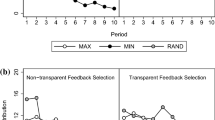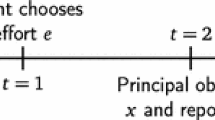Abstract
Belief elicitation is an important methodological issue for experimental economists. There are two generic questions: 1) Do incentives increase belief accuracy? 2) Are there interaction effects of beliefs and decisions? We investigate these questions in the case of finitely repeated public goods experiments. We find that belief accuracy is significantly higher when beliefs are incentivized. The relationship between contributions and beliefs is slightly steeper under incentives. However, we find that incentivized beliefs tend to lead to higher contribution levels than either non-incentivized beliefs or no beliefs at all. We discuss the implications of our results for the design of public good experiments.
Similar content being viewed by others
References
Andersen, S., Fountain, J., Harrison, G. W., & Rutström, E. E. (2007). Eliciting beliefs: theory and experiments. Working Paper 07-08, Department of Economics, College of Business Administration, University of Central Florida.
Bhatt, M., & Camerer, C. F. (2005). Self-referential thinking and equilibrium as states of mind in games: fMRI evidence. Games and Economic Behavior, 52, 424–459.
Blanco, M., Engelmann, D., Koch, A. K., & Normann, H.-T. (2010, forthcoming). Belief elicitation in experiments: Is there a hedging problem?. Experimental Economics. 10.1007/s10683-010-9249-1.
Camerer, C. F. F., & Hogarth, R. M. (1999). The effects of financial incentives in experiments: A review and capital-labor-production framework. Journal of Risk and Uncertainty, 19, 7–42.
Costa-Gomes, M. A., & Weizsäcker, G. (2008). Stated beliefs and play in normal-form games. Review of Economic Studies, 75, 729–762.
Croson, R. (1999). The disjunction effect and reason-based choice in games. Organizational Behavior and Human Decision Processes, 80, 118–133.
Croson, R. (2000). Thinking like a game theorist: Factors affecting the frequency of equilibrium play. Journal of Economic Behavior & Organization, 41, 299–314.
Croson, R. (2007). Theories of commitment, altruism and reciprocity: Evidence from linear public goods games. Economic Inquiry, 45, 199–216.
Dawes, R. M., McTavish, J., & Shaklee, H. (1977). Behavior, communication, and assumptions about other peoples behavior in a commons dilemma situation. Journal of Personality and Social Psychology, 35, 1–11.
Dufwenberg, M., Gächter, S., & Hennig-Schmidt, H. (2006). The framing of games and the psychology of strategic choice. CeDEx Discussion Paper 2006-20, University of Nottingham.
Dufwenberg, M., & Gneezy, U. (2000). Measuring beliefs in an experimental lost wallet game. Games and Economic Behavior, 30, 163–182.
Erev, I., Bornstein, G., & Wallsten, T. S. (1993). The negative effects of probability assessments on decision quality. Organizational Behavior and Human Decision Processes, 55, 78–93.
Fischbacher, U. (2007). Z-tree: Zurich toolbox for readymade economic experiments. Experimental Economics, 10, 171–178.
Fischbacher, U., & Gächter, S. (2010). Social preferences, beliefs, and the dynamics of free riding in public good experiments. American Economic Review, 100, 541–556.
Fischbacher, U., Gächter, S., & Fehr, E. (2001). Are people conditionally cooperative? Evidence from a public goods experiment. Economics Letters, 71, 397–404.
Gächter, S., & Herrmann, B. (2009). Reciprocity, culture, and human cooperation: Previous insights and a new cross-cultural experiment. Philosophical Transactions of the Royal Society B – Biological Sciences, 364, 791–806.
Greiner, B. (2004). An online recruitment system for economic experiments. In K. Kremer & V. Macho (Eds.), Forschung und Wissenschaftliches Rechnen. GWDG Bericht 63. Göttingen: Gesellschaft für Wissenschaftliche Datenverarbeitung.
Herrmann, B., & Thöni, C. (2009). Measuring conditional cooperation: A replication study in Russia. Experimental Economics, 12, 87–92.
Herrmann, B., Thöni, C., & Gächter, S. (2008). Antisocial punishment across societies. Science, 319, 1362–1367.
Hertwig, R., & Ortmann, A. (2001). Experimental practices in economics: a methodological challenge for psychologists?. Behavioral and Brain Sciences, 24, 383.
Holt, C. A. (1986). Scoring-rule procedures for eliciting subjective probability and utility functions. In P. Goel & A. Zellner (Eds.), Bayesian inference and decision techniques. Amsterdam: Elsevier.
Kelley, H., & Stahelski, A. (1970). Social interaction basis of cooperators’ and competitors’ beliefs about others. Journal of Personality and Social Psychology, 16, 190–219.
Kocher, M. G., Cherry, T., Kroll, S., Netzer, R. J., & Sutter, M. (2008). Conditional cooperation on three continents. Economics Letters, 101, 175–178.
Kuhlman, D. M., & Wimberley, D. L. (1976). Expectations of choice behavior held by cooperators, competitors, and individualists across four classes of experimental games. Journal of Personality & Social Psychology, 34, 69–81.
Ledyard, J. O. (1995). Public goods: A survey of experimental research. In A. E. Stapel Roth & J. H. Kagel (Eds.), The handbook of experimental economics. Princeton: Princeton University Press.
Manski, C. F. (2004). Measuring expectations. Econometrica, 72, 1329–1376.
Muller, L., Sefton, M., Steinberg, R., & Vesterlund, L. (2008). Strategic behavior and learning in repeated voluntary-contribution experiments. Journal of Economic Behavior & Organization, 67, 782–793.
Neugebauer, T., Perote, J., Schmidt, U., & Loos, M. (2009). Self-biased conditional cooperation: On the decline of cooperation in repeated public goods experiments. Journal of Economic Psychology, 30, 52–60.
Nyarko, Y., & Schotter, A. (2002). An experimental study of belief learning using elicited beliefs. Econometrica, 70, 971–1005.
Offerman, T. (1997). Beliefs and decision rules in public good games. Theory and experiments. Dordrecht: Kluwer.
Offerman, T., Sonnemans, J., & Schram, A. (1996). Value orientations, expectations and voluntary contributions in public goods. Economic Journal, 106, 817–845.
Offerman, T., Sonnemans, J., Van De Kuilen, G., & Wakker, P. P. (2009). A truth serum for non-bayesians: Correcting proper scoring rules for risk attitudes. Review of Economic Studies.
Palfrey, T. R., & Wang, S. W. (2009). On eliciting beliefs in strategic games. Journal of Economic Behavior & Organization, 71, 98–109.
Rutström, E. E., & Wilcox, N. T. (2009). Stated beliefs versus inferred beliefs: A methodological inquiry and experimental test. Games and Economic Behavior, 67, 616–632.
Selten, R. (1998). Axiomatic characterization of the quadratic scoring rule. Experimental Economics, 1, 43–62.
Smith, V. L., & Walker, J. M. (1993). Monetary rewards and decision cost in experimental economics. Economic Inquiry, 31, 245–261.
Thöni, C., Tyran, J.-R., & Wengström, E. (2009). Microfoundations of social capital. Discussion Paper No. 09-24, Department of Economics, University of Copenhagen.
Wilcox, N. T., & Feltovich, N. (2000). Thinking like a game theorist: Comment. Mimeo, University of Houston, available at http://www.uh.edu/~nfelt/papers/belief.pdf.
Wright, W. F., & Aboul-Ezz, M. E. (1988). Effects of extrinsic incentives on the quality of frequency assessments. Organizational Behavior and Human Decision Processes, 41, 143–152.
Author information
Authors and Affiliations
Corresponding author
Electronic Supplementary Material
Rights and permissions
About this article
Cite this article
Gächter, S., Renner, E. The effects of (incentivized) belief elicitation in public goods experiments. Exp Econ 13, 364–377 (2010). https://doi.org/10.1007/s10683-010-9246-4
Received:
Accepted:
Published:
Issue Date:
DOI: https://doi.org/10.1007/s10683-010-9246-4




